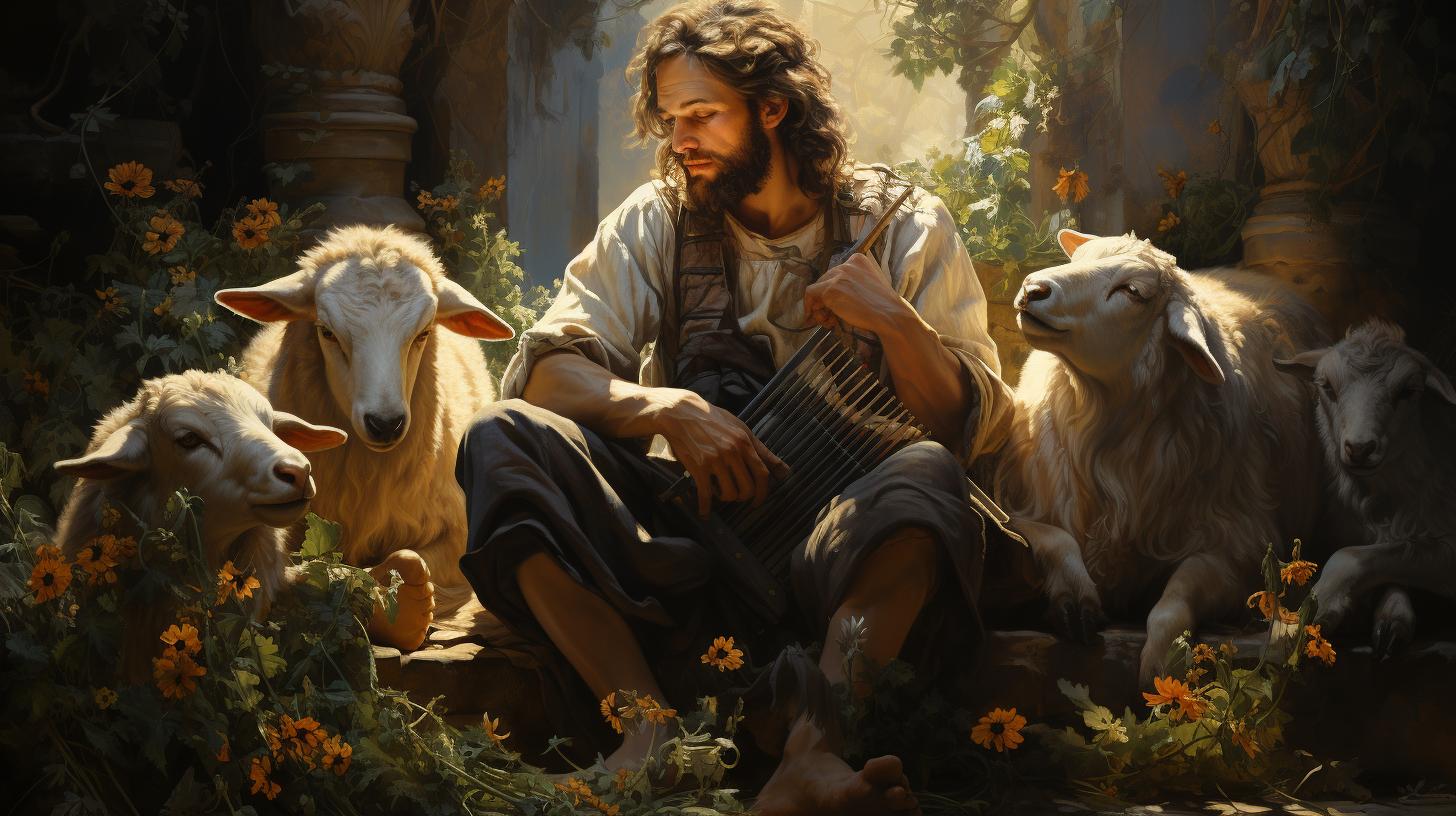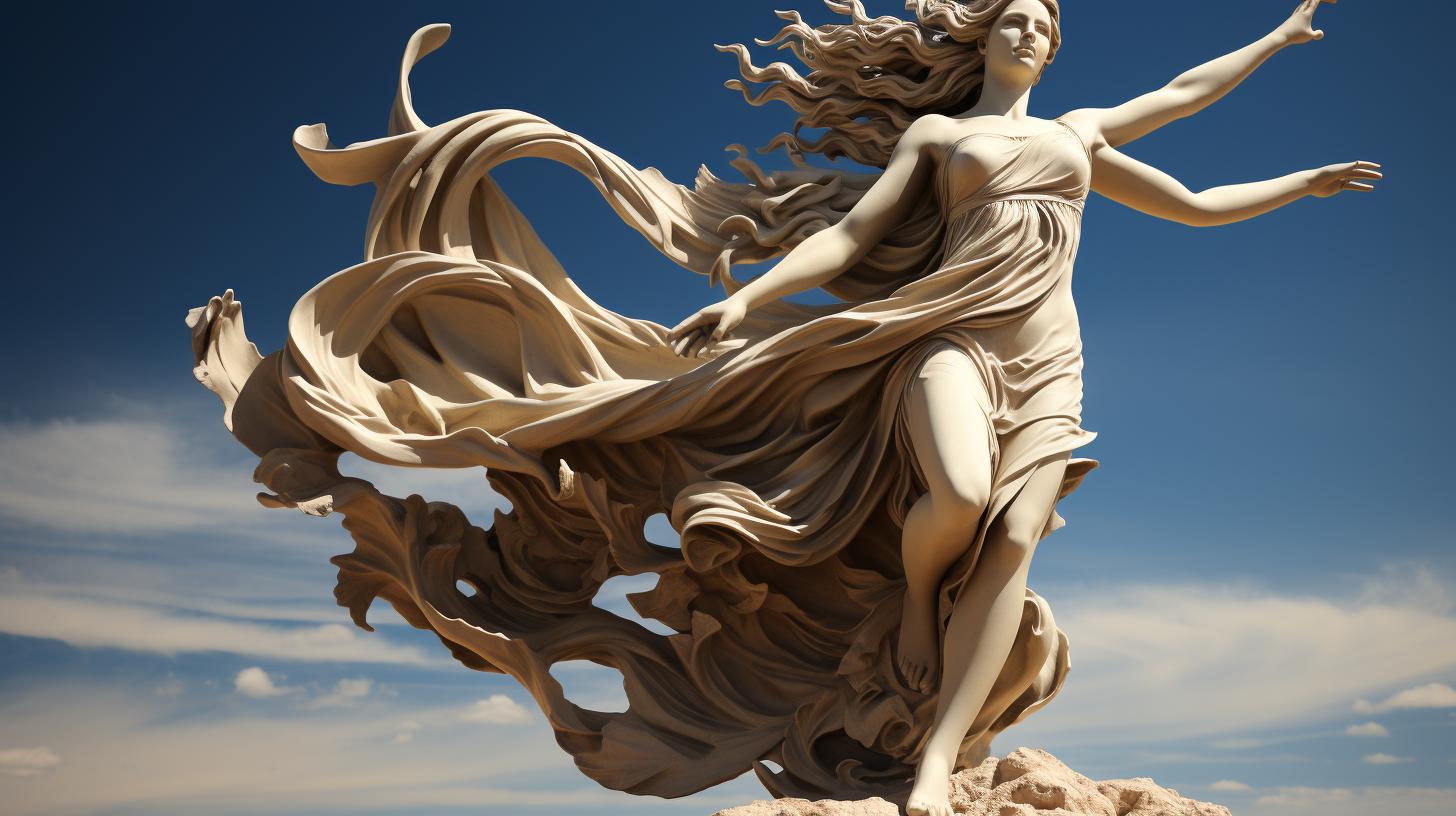Tyche: The Greek Goddess of Luck and Fortune

Tyche, the Greek goddess of luck and fortune, played a significant role in ancient Greek society. Believed to be the daughter of the titans Oceanus and Tethys, or in some versions, Zeus, Tyche was revered as the protector of cities and their destinies.
Associated with both personal and communal luck, she was worshiped in temples across various cities. Tyche’s influence extended to natural disasters, political events, and even the outcome of theatrical performances. Her iconic representation with a mural crown and symbolic objects like a helm and cornucopia symbolized her status as the bringer of fortune.
The Origins of Tyche: Greek Mythology and Genealogy
In Greek mythology, Tyche, the goddess of luck and fortune, has intriguing origins that are steeped in ancient lore. She is believed to be the daughter of Oceanus and Tethys, who were both titans in Greek mythology.
However, some versions suggest that Zeus himself is Tyche’s father, adding an air of divine lineage to her existence. Another belief holds that Tyche is descended from the titan Prometeus, further weaving her into the intricate tapestry of Greek mythology.
These various accounts of Tyche’s parentage give her a unique and elusive identity, hinting at her enigmatic nature and auspicious role in the lives of mortals. Whether she is the offspring of Oceanus and Tethys or has direct ties to Zeus and Prometeus, Tyche’s heritage highlights her significance as a divine being in Greek mythology.
As the goddess of luck and fortune, Tyche holds sway over the destiny of individuals, cities, and even entire civilizations. Her influence transcends mere chance, as she is considered the personification of serendipity and fate.
Tyche’s intriguing genealogy further solidifies her position as a powerful deity whose origins are intertwined with the fabric of Greek mythology.
Tyche in Greek Society: Her Role and Significance
Within Greek society, Tyche held a significant role as the goddess of luck and fortune. She was revered for her ability to shape the fate of individuals and cities alike. As the deity responsible for the destiny of a city, Tyche was considered the protector and guardian of its well-being.
Many Greeks attributed their successes and failures to the influence of Tyche. They believed that she controlled not only unexpected political events, but also natural phenomena such as floods and droughts.
This association with both personal and communal luck made Tyche a prominent figure in the lives of the ancient Greeks.
- Under Tyche’s watchful eye, cities sought her favor and protection through acts of worship and devotion.
Temples dedicated to her were erected in various cities, including Argos, Itanos, and Alexandria.
- Symbolizing her role as the guardian of a city, Tyche was often depicted wearing a symbolic mural crown on her head.
This crown represented the walls and fortifications that safeguarded the city from harm.
- Other symbols associated with Tyche included a helm, representing her guidance in steering the course of a city’s fortune, and a cornucopia, symbolizing abundance and prosperity.
- In Greek society, Tyche’s influence extended beyond the physical realm.
She played a crucial role in the theater, where she was invoked to grant good fortune and unexpected twists of fate during performances.
Filósofos como Platón y Aristóteles también discutieron sobre Tyche, y su imagen se representaba en muchos medios, incluyendo monedas, esculturas y mosaicos.
As the Greeks contended with the capricious nature of luck and fortune, Tyche embodied the unpredictable and dualistic aspects of fate. She was often depicted with two faces, one representing divine guidance and protection, and the other reflecting the destructive and unfortunate whims of destiny.
Tyche’s significance in Greek society extended beyond her individual role. She had connections with other deities, such as the Moiras, who controlled the threads of life, and Nemesis, the goddess of retribution.
These relationships emphasized the intricate web of divinity and its influence on the lives of mortals.
Overall, Tyche’s role and significance in Greek society cannot be understated. As the bringer of luck and fortune, she held sway over the destiny of cities and individuals, and her influence permeated every aspect of Greek life.
From her association with cities and protective symbolism to her dual nature and connections with other deities, Tyche captivated the imagination and shaped the beliefs of the ancient Greeks.
Tyche’s Association with Cities: Patronage and Worship
Tyche, the Greek goddess of luck and fortune, held a special place in the hearts of ancient Greeks, especially in relation to cities.
She was revered as the deity who protected and guided the destiny of each city, making her a widely worshipped figure.
Cities throughout Greece recognized Tyche as their patron, attributing their successes and failures to her influence.
They believed that she held the power to determine their fate and ensure their prosperity. Tyche’s association with cities extended beyond just being a symbol of good luck. She was seen as the embodiment of a city’s good fortune, representing the collective luck and destiny of its inhabitants.
Worship of Tyche took place in temples dedicated to her in various cities, such as Argos, Itanos, and Alexandria. These temples were spaces where people could pay homage to Tyche, seeking her blessings and favor.
Through rituals and offerings, individuals and communities expressed their gratitude and sought her continued protection.
Devotees believed that Tyche’s presence in their cities brought them harmony, abundance, and prosperity. As they faced challenges, they turned to her for guidance and relied on her to influence their city’s journey.
Tyche symbolized the unpredictable nature of luck and the belief that her favor could change the course of events.
- Tyche’s association with cities encompassed:
- Protection and guidance over a city’s destiny
- Recognition as the city’s patron deity
- Worship in dedicated temples
- Representation of collective luck and fortune
- Seeking blessings and favor through rituals and offerings
Tyche’s association with cities went beyond mere superstitions; it had a significant impact on the daily lives and decisions of the people.
Whether facing political uncertainty or seeking success in their endeavors, the presence of Tyche offered a sense of hope and a belief that their city’s destiny was not entirely beyond their control.
Tyche’s Symbolism and Iconography: The Mural Crown and Other Attributes
The symbolism associated with Tyche, the Greek goddess of luck and fortune, was depicted through various attributes and iconography. One of the most prominent symbols associated with Tyche is the mural crown, which represents her role as a protector of cities.
This crown, adorned with towers or walls, symbolizes the divine guidance and safeguarding Tyche provided to her chosen city.
In addition to the mural crown, Tyche was often depicted holding a variety of other attributes that represented her association with luck and prosperity. One of these attributes is the helm, symbolizing her influence over the course of events and the ability to steer fate in a favorable direction.
Another significant attribute is the cornucopia, or the horn of plenty, which symbolizes abundance and blessings.
Furthermore, Tyche’s iconography often included representations of dice, emphasizing her role in determining unpredictable outcomes and the element of chance. It is believed that Palamedes, a Greek hero, created the first dice and dedicated them to Tyche as an offering.
The various symbols and attributes associated with Tyche’s iconography served to visually convey her power and influence over luck and fortune. Through the mural crown, helm, cornucopia, and dice, Tyche was personified as the goddess who could shape the destiny of cities and individuals alike, bringing either prosperity or adversity.
Tyche’s Dual Nature: Benevolent and Destructive Aspects
Tyche, the Greek goddess of luck and fortune, had a complex nature that encompassed both benevolent and destructive aspects. She was often depicted with two faces, symbolizing her dual nature and the contrasting sides of her influence.
On one hand, Tyche represented the guiding and protective aspect of fate. She was believed to bring good fortune, prosperity, and success to individuals and cities alike. Many worshipped her with the hope of receiving her blessings and favor.
In times of uncertainty, people would invoke Tyche to ensure positive outcomes in their endeavors and to navigate the unpredictable twists and turns of life.
However, Tyche also had a darker side.
She was associated with capriciousness and unexpected misfortune. Just as she could bring luck, she could also bring setbacks and challenges. Her influence extended beyond mere chance, as she was believed to have control over events such as floods, droughts, and unexpected political turmoil.
- She could turn a prosperous city into ruins, leaving its inhabitants to suffer.
- She could disrupt the plans of those who believed they were on the path to success, leading them to unexpected failure.
- She could bring about unforeseen shifts in power and political landscapes.
These destructive aspects of Tyche’s nature served as a reminder of the unpredictability of life and the need to balance hope with caution.
It was essential for individuals and communities to respect and appease Tyche in order to avoid her wrath and secure her favor.
Despite her dual nature, Tyche’s influence in Greek society remained significant.
People sought her guidance and protection, acknowledging that luck and fortune played crucial roles in their lives. Her portrayal with two faces highlighted the interconnectedness of positive and negative outcomes, emphasizing the delicate balance between good and bad fortune.
Throughout history and across different cultures, Tyche’s dual nature has continued to captivate and intrigue. Her representation in art, literature, and religious practices serves as a reminder of the complexity of luck and the ever-present interplay between chance, destiny, and human agency.
Tyche’s Connections with Other Deities: Moiras and Nemesis
Tyche, the Greek goddess of luck and fortune, had significant connections with other deities in Greek mythology, including the Moiras and Nemesis.
The Moiras, also known as the Fates, were three goddesses who controlled the destiny and life of every individual.
Tyche’s association with the Moiras suggests her role in shaping the course of events for both individuals and cities. While the Moiras determined the ultimate fate, Tyche influenced the luck and fortune that accompanied these predetermined outcomes.
Nemesis, the goddess of retribution and vengeance, also had ties to Tyche. Nemesis ensured that individuals and societies received their due consequences for their actions. Therefore, Tyche’s connection with Nemesis suggests her role in facilitating the balance between luck and justice, ensuring that fortune did not go unchecked.
These relationships highlight the complex and multifaceted nature of Tyche’s influence. While she represented luck and chance, her connections with the Moiras and Nemesis underscored her involvement in the broader concepts of fate, destiny, and justice.
Tyche in Art and Culture: Depictions and Representations
Tyche, the Greek goddess of luck and fortune, played a significant role in art and culture throughout history. Her depictions and representations varied, showcasing her importance in Greek society.
1. Iconography: Tyche was commonly portrayed with a variety of symbolic attributes that emphasized her role as the bringer of luck.
One of her most recognizable symbols was the mural crown, which symbolized her connection with cities. This crown was often depicted on her head, showcasing her patronage over a specific city or region.
Additionally, other symbols such as a helm and a cornucopia were also associated with Tyche, representing her power over fate and abundance.
2. Sculptures: Statues and sculptures of Tyche were created to honor and venerate her.
These sculptures often depicted her in a regal manner, wearing a flowing garment and holding the symbols of her authority. They were placed in temples and public spaces, serving as a visual representation of her presence and influence.
The sculptures were meticulously crafted, capturing the essence of Tyche’s benevolent and protective nature.
3. Mosaics and Frescoes: Tyche’s image was also portrayed in intricate mosaics and frescoes, particularly in the ancient city of Pompeii.
These artworks showcased her as a central figure, surrounded by other symbolic elements like dice, representing chance and fortune. The mosaics and frescoes elevated Tyche’s status, highlighting her role as the bringer of luck and prosperity in daily life.
4. Coins: Tyche’s influence extended into the realm of currency, as her image was often featured on ancient Greek and Roman coins. These coins served not only as a medium of exchange but also as a representation of the city’s prosperity and divine protection.
Tyche’s depiction on coins added a sense of legitimacy and divine favor to the rulers of the time.
5. Theater: Tyche’s presence was felt in the world of theater, where she was often invoked for good luck before performances.
The unpredictable nature of theater aligned with Tyche’s role as the guide of unexpected events. Playwrights and actors believed that invoking Tyche could bring success and favorable outcomes to their productions.
Tyche’s depictions and representations in art and culture celebrated her power and influence as the goddess of luck and fortune. Through sculptures, mosaics, coins, and her association with theater, she remained a prominent figure in Greek society, embodying both the benevolent and destructive aspects of fate.
Tyche’s Influence on Natural and Political Events
Tyche, the Greek goddess of luck and fortune, held immense power over both natural and political events. It was believed that she directly impacted phenomena such as floods, droughts, and unexpected political occurrences.
The ancient Greeks recognized her as the driving force behind these events and looked to her for guidance and favor.
During the Hellenistic period, Tyche’s influence surpassed that of the Olympic gods, taking center stage in the everyday lives of individuals and communities.
Her presence was not confined to the abstract realm of luck, but rather she directly impacted the outcomes of significant events.
Poets such as Pindar and historians like Polybius supported the idea that Tyche played a crucial role in shaping the course of cities and nations.
They attributed both fortunate and unfortunate occurrences to the intercession of Tyche, emphasizing her role as the unpredictable arbiter of destinies. It was through her capricious nature that political power shifted and empires rose and fell.
- Tyche’s Influence on Natural Events:
- Tyche’s Domain of Political Events:
Tyche’s Influence on Natural Events:
As the goddess governing luck and fortune, Tyche held sway over natural phenomena. The ancient Greeks believed that she had the power to cause floods, droughts, hurricanes, and other natural disasters.
The whims of Tyche were seen as the causal factors behind these calamities, and people sought to appease her through various rituals and offerings.
Tyche’s Domain of Political Events:
Tyche’s role extended beyond natural events to the political sphere. She was considered the guardian deity of cities and their fate. This encompassed not only the rise and fall of political leaders and empires but also unexpected political developments that shaped the course of history.
The Greeks saw Tyche as the hidden hand that determined the outcomes of wars, alliances, and diplomatic endeavors.
The influence of Tyche on political events was so profound that her presence was sought and acknowledged in various official acts, such as the minting of coins and the creation of statues.
These representations of Tyche not only legitimized the authority of kings and rulers but also reinforced the belief in her abilities to steer fortunes.
Throughout Greek society, Tyche’s association with natural and political events prompted people to invoke her name in times of uncertainty, seeking her favor and hoping for a positive outcome.
Her influence transcended the boundaries of mythology and became an integral part of Greek culture and belief systems.
Tyche in Roman and Parthian Empires: Continuation and Adaptation
As the influence of Greek culture spread throughout the ancient world, the worship and reverence for Tyche, the Greek goddess of luck and fortune, also reached the Roman and Parthian Empires.
In these empires, Tyche’s role and significance underwent some adaptations, reflecting the cultural and religious blending that occurred during this period.
In the Roman Empire, Tyche was assimilated into the Roman pantheon of gods and goddesses.
She became identified with the Roman goddess Fortuna, who shared similar attributes and responsibilities. This fusion of Tyche and Fortuna allowed for a shared understanding and worship of luck and fortune among the Roman populace.
Tyche’s presence in Roman society was further solidified through the depiction of her imagery on coins, statues, and other artistic mediums.
Similarly, in the Parthian Empire, Tyche’s influence was also recognized and integrated into the local religious practices.
The Parthian rulers sought to legitimize their reign and gain public favor by associating themselves with Tyche. They depicted her on their coinage and commissioned statues in her honor, which served as a symbol of their power and divine protection.
It’s important to note that while Tyche’s worship continued in these empires, her representation and attributes might have been influenced by the cultural nuances and beliefs of the respective empires. Nevertheless, her role as a goddess of luck and fortune remained central, and her association with cities and their destinies persisted.
The continuity and adaptation of Tyche’s worship in the Roman and Parthian Empires demonstrate the lasting impact of Greek mythology and its deities on the broader ancient world. Tyche’s presence served as a testament to the universal significance of luck and fortune, as well as the human desire to seek divine favor and protection in all aspects of life.
The Legacy of Tyche: Her Significance throughout History
Throughout history, the legacy of Tyche, the Greek goddess of luck and fortune, has endured, leaving a profound impact on various aspects of society. Her influence extended beyond the realm of mythology, shaping cultural, philosophical, and artistic endeavors for centuries to come.
One significant area where Tyche’s legacy remains evident is in the development of the concept of luck itself. The notion that fortune could be both unpredictable and influential can be traced back to the worship of Tyche.
Her dual nature, embodying both luck’s benevolent and destructive aspects, challenged individuals to navigate the unpredictable nature of life.
Furthermore, Tyche’s association with cities and her role as the patron deity bestowed a sense of collective identity and shared destiny. The belief in her divine intervention in the fate of a city fostered a community spirit and also served as a source of comfort during uncertain times.
Tyche’s symbolism, particularly the mural crown she often wore, became an iconic representation of luck and prosperity. This imagery persisted in ancient art and influenced subsequent depictions of fortune in various forms of visual expression.
As centuries passed, Tyche’s legacy transcended cultural boundaries, as seen in the Roman and Parthian Empires. The adoption and adaptation of Tyche into their own pantheons validated her enduring significance.
She continued to be revered through the striking imagery on coins and statues, lending legitimacy to the ruling figures.
Tyche’s influence also resonated in the intellectual sphere. Philosophers such as Plato and Aristotle contemplated the role of luck in shaping human lives, engaging in philosophical debates that delved into the complexities of fate and chance.
Their discussions provided a framework for understanding the intricate relationship between luck, destiny, and human agency.
In conclusion, Tyche’s significance throughout history is multifaceted and far-reaching. From shaping the concept of luck to influencing artistic representations and philosophical musings, her legacy endures as a reminder of the intricate interplay between fortune and human existence.
As we reflect on Tyche’s enduring impact in the year 2023, we acknowledge her profound influence on the human experience and the lasting imprint she has left on our cultural narrative.
.




















